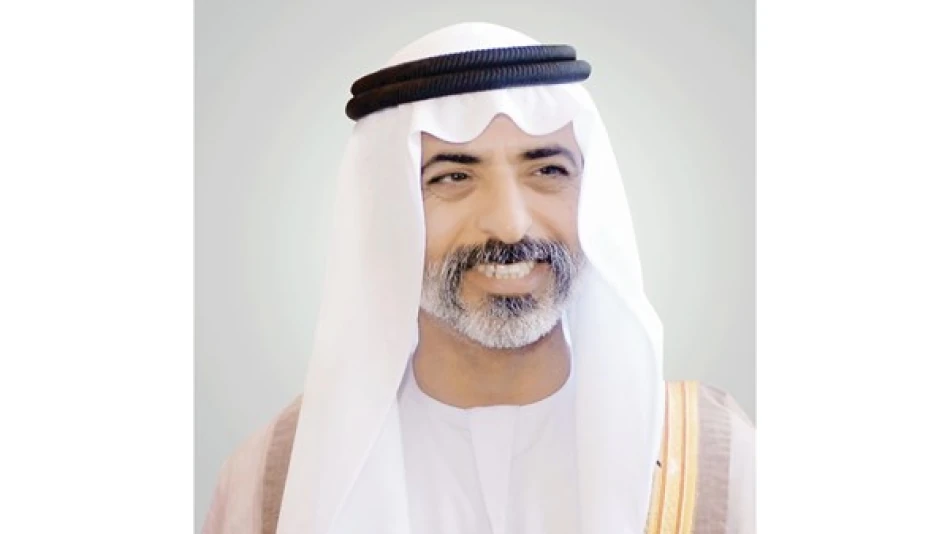
Emirati Leader Emphasizes Commitment to National Identity Values
UAE Launches Major Youth Initiative to Strengthen National Identity Through University Programs
The United Arab Emirates is intensifying efforts to cultivate national identity among its younger generation through an ambitious summer program targeting university students across the country. Led by Sheikh Nahyan bin Mubarak Al Nahyan, Minister of Tolerance and Coexistence, the "National Identity Pioneers" initiative represents a strategic shift from passive patriotism to active civic engagement, transforming national belonging into concrete community action.
Strategic Youth Engagement Beyond Traditional Patriotism
The program, operating under the umbrella of the Nation Fund, spans universities in Abu Dhabi, Al Ain, Fujairah, and Dubai through July 31. Unlike conventional citizenship programs that focus on ceremonial displays of patriotism, this initiative emphasizes practical skill-building and community leadership development.
Sheikh Nahyan expressed particular pride in how Emirati university students have successfully "transformed belonging to the homeland and loyalty to its leadership from mere words or feelings into initiatives and actions." This approach reflects a broader trend across Gulf states to engage youth as active stakeholders in national development rather than passive recipients of state benefits.
Institutional Framework and Leadership Development
The program's structure reveals sophisticated institutional thinking. Students participate in interactive workshops on Emirati national identity values, youth-led dialogue sessions, and brainstorming sessions for developing youth initiatives. The curriculum includes deep dives into local heritage and authentic Emirati environmental connections, suggesting a move beyond surface-level cultural appreciation.
A keynote lecture by Sheikh Nahyan at Mohammed bin Zayed University for Humanities will bring together participants from national identity clubs, tolerance clubs, and tolerance committees across government institutions. This cross-institutional approach indicates serious coordination between the Ministry of Tolerance, Ministry of Youth, and educational establishments.
Cultural Preservation Meets Modern Engagement
Yasser Al-Qarqawi, Director General of the Nation Fund, emphasized the program's focus on Arabic language preservation through the slogan "Arabic is the language of the Quran." This religious framing serves dual purposes: reinforcing cultural authenticity while connecting language preservation to spiritual values that resonate across Emirati society.
The initiative's emphasis on "authentic values and noble morals derived from the Holy Quran" positions national identity within Islamic frameworks, distinguishing the UAE's approach from purely secular nationalism seen in other regions. This strategy likely aims to counter potential cultural dilution from the country's rapid internationalization and expatriate majority population.
Long-term Strategic Implications
The program's two-week intensive format, combined with year-round projects planned by the Nation Fund, suggests institutional commitment beyond symbolic gestures. Students engage in "research on topics and issues related to national identity" and exchange experiences on strengthening identity within educational and community environments.
This approach mirrors successful youth engagement strategies in Singapore and South Korea, where governments invested heavily in civic education programs that produced generations of nationally-minded citizens capable of driving economic development while maintaining cultural distinctiveness.
Market and Governance Perspective
From a governance standpoint, this initiative addresses a critical challenge facing Gulf states: maintaining social cohesion and national identity in rapidly globalizing economies. The UAE's expatriate population exceeds 85%, making cultural preservation and citizen engagement essential for long-term political stability.
The program's focus on practical skills and community leadership development could produce a generation better equipped to assume leadership roles in both public and private sectors. This human capital development approach aligns with the UAE's Vision 2071 goals of becoming a global hub while maintaining distinct national character.
Regional Context and Innovation
While Saudi Arabia's Vision 2030 emphasizes economic diversification and social liberalization, the UAE's approach appears more focused on cultural consolidation and civic engagement. This strategy may prove more sustainable in maintaining social stability during rapid economic transformation.
Student participants described the experience as "exceptional" for enabling "open discussions and important information about the country's history, identity, culture, and authentic values." Such feedback suggests genuine engagement rather than perfunctory participation, indicating potential for lasting impact on civic attitudes and behaviors.
The success of this initiative could influence similar programs across the Gulf Cooperation Council, where governments increasingly recognize that economic prosperity alone cannot guarantee social cohesion or political legitimacy among educated youth populations with global perspectives and opportunities.
Most Viewed News

 Layla Al Mansoori
Layla Al Mansoori






